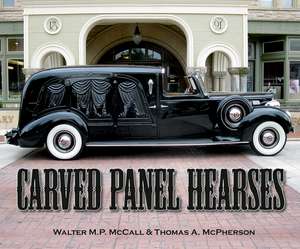Carved-Panel Hearses: An Illustrated History 1933-1948
Autor Walter McCall, Thomas A. McPhersonen Limba Engleză Paperback – 31 mai 2011
In 1933 the Sayers & Scovill Co. of Cincinnati, Ohio and The Eureka Co. of Rock Falls, Illinois, introduced a daring new departure in funeral car design. This stunning, semi-streamlined new hearse design featured richly-carved imitation drapery panels—complete with folds, fringes, tassels and tieback cords—on the sides and rear of the car.
Preț: 260.89 lei
Nou
Puncte Express: 391
Preț estimativ în valută:
49.92€ • 52.26$ • 41.31£
49.92€ • 52.26$ • 41.31£
Carte indisponibilă temporar
Doresc să fiu notificat când acest titlu va fi disponibil:
Se trimite...
Preluare comenzi: 021 569.72.76
Specificații
ISBN-13: 9781583882818
ISBN-10: 1583882812
Pagini: 126
Ilustrații: 30 color &140 b/w ill
Dimensiuni: 213 x 277 x 10 mm
Greutate: 0.52 kg
Editura: ICONOGRAFIX
ISBN-10: 1583882812
Pagini: 126
Ilustrații: 30 color &140 b/w ill
Dimensiuni: 213 x 277 x 10 mm
Greutate: 0.52 kg
Editura: ICONOGRAFIX
Notă biografică
Walter M. P. McCall is one of the most widely known and respected fire apparatus historians and authors in North America. In addition to his highly regarded American Fire Engines Since 1900 ߝ still considered the “bible” of the old fire engine hobby ߝ Walt McCall has authored over a dozen Iconografix fire apparatus and professional car books.
Thomas A. McPherson's byline is well known to most professional car enthusiasts. Because he has been documenting the history of the professional car industry and its products for many years, he is considered by many to be the leading authority in the field. He has co-authored a few books on funeral cars &hearses, as well as self-published 3 hefty books on his own ߝ Flxible, Eureka and Superior.
Thomas A. McPherson's byline is well known to most professional car enthusiasts. Because he has been documenting the history of the professional car industry and its products for many years, he is considered by many to be the leading authority in the field. He has co-authored a few books on funeral cars &hearses, as well as self-published 3 hefty books on his own ߝ Flxible, Eureka and Superior.
Descriere
In 1933 the Sayers &Scovill Co. of Cincinnati, Ohio and The Eureka Co. of Rock Falls, Illinois, introduced a daring new departure in funeral car design. This stunning, semi-streamlined new hearse design featured richly-carved imitation drapery panels—complete with folds, fringes, tassels and tieback cords—on the sides and rear of the car. The artistic, carved-panel hearse swept the industry overnight. Soon every major funeral coachbuilder in America (with one notable exception) introduced highly individualistic carved-panel hearses of their own design. A less ornate second-generation carved funeral coach that featured stylized gothic-panel church windows instead of faux draperies was introduced in the late 1930s and both types remained until 1948. The classic era of the carved hearse has never been equaled in terms of impressive beauty and artistic individuality, here featured exquisitely in impressive large archival photographs. It was a brief but nonetheless spectacular period of stylistic expression and custom coachcraft—the likes of which we shall never see again.
